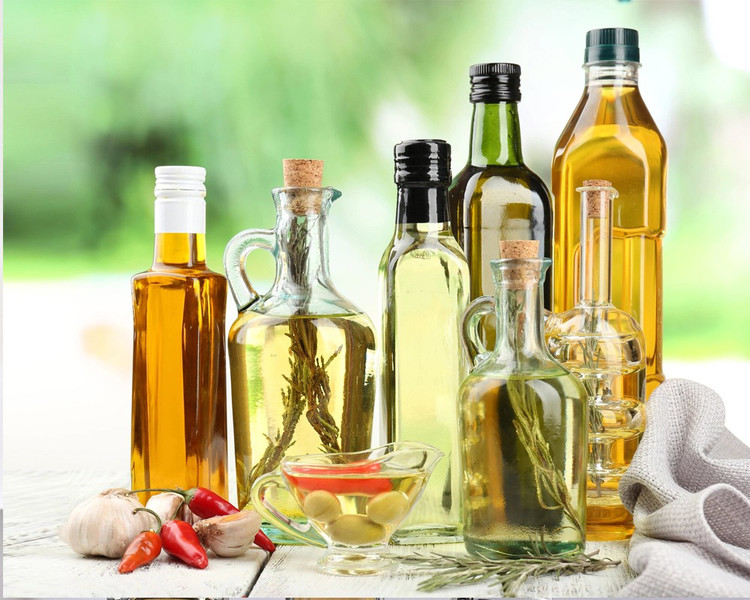The case of the Ofood cooking oil brand of Nhat Minh Food Production and Import-Export Company Limited producing cooking oil for humans from animal feed oil has made consumers confused about how to choose and use cooking oil properly.
Doctors and nutritionists at the Vietnam Institute of Applied Medicine said that choosing the right type of vegetable oil, with beneficial fatty acid content and suitable for the processing method, will help increase the nutritional value of the meal, support the body to effectively prevent many non-communicable diseases, especially cardiovascular diseases and lipid disorders...
According to doctors at the Vietnam Institute of Applied Medicine, cooking oil or vegetable oil is an essential ingredient in the daily diet, playing an important role in providing lipids and energy, supporting the absorption of fat-soluble vitamins such as A, D, E, K.
Not only that, fat in cooking oil is also a precursor of some hormones, regulating inflammatory and immune responses and metabolism in the body.

It should be noted that the health effects of cooking oils depend largely on the type of fatty acids they provide – specifically the ratio of saturated to unsaturated fatty acids. When choosing vegetable oils, the following important factors should be considered:
Prioritize vegetable oils rich in unsaturated fatty acids
Unsaturated fatty acids, including monounsaturated fatty acids (MUFA) and polyunsaturated fatty acids (PUFA), are healthy fat components, recommended by the World Health Organization (WHO) and many international cardiovascular associations for regular use to replace saturated fat.
Cooking oils with a high proportion of unsaturated fatty acids, such as olive oil, canola oil, sunflower oil, rice bran oil or soybean oil, have the ability to help reduce total cholesterol and "bad" LDL-cholesterol levels, thereby contributing to the prevention of atherosclerosis and cardiovascular complications.
Additionally, some oils, such as canola oil, provide alpha-linolenic acid (ALA), a form of omega-3 that has anti-inflammatory and brain-healthy effects. Choosing vegetable oils rich in MUFA and PUFA not only improves blood lipids but also supports endothelial function, blood pressure, and glucose metabolism.
Some vegetable oils, such as coconut oil and palm oil, contain very high levels of saturated fatty acids – up to 80–90% depending on the manufacturing process. When consumed in large amounts or over a long period of time, these saturated fatty acids can increase the level of “bad” LDL-cholesterol in the blood, increasing the risk of atherosclerosis, high blood pressure and cardiovascular disease.
Therefore, these oils should be used sparingly and should not be the main source of fat in the daily diet. These vegetable oils should not be used in the diet of young children or older people with cardiovascular risk factors or chronic diseases.
Choose cooking oil suitable for the purpose of use in cooking
Heat stability and smoke point are two important factors to consider when choosing cooking oil. When oil is heated beyond its smoke point, it decomposes, creating harmful oxidized compounds such as aldehydes and acrolein, which can adversely affect the respiratory system, increase oxidative stress and increase the risk of cancer if used for a long time.
Using the right type of oil according to the cooking method not only helps preserve nutrients but also minimizes the risk of toxins during cooking.
For high temperature cooking methods such as frying, stir-frying, and baking, you should choose oils with a high and stable smoke point such as sunflower oil (smoke point 230 degrees C), soybean oil (smoke point 200 degrees C), and canola oil (smoke point 200 degrees C).
In contrast, less refined oils or oils rich in antioxidants such as extra virgin olive oil (smoke point around 160 degrees C), sesame oil (smoke point 170-180 degrees C) should only be used in dishes that do not require high heat, such as salad dressings, sauces, or quick stir-fries, or added to cooked soups, porridges, and stews.

Prioritize using less refined oils, keeping the biological active ingredients intact.
Refining of edible oils is aimed at removing impurities, undesirable flavors and increasing shelf life. However, over-refining can destroy a large part of the oil's natural bioactive compounds such as polyphenols, phytosterols, tocopherols (vitamin E), and carotenoids.
In contrast, cold-pressed or extra virgin vegetable oils are produced mechanically at low temperatures, which helps retain almost all of the original nutritional value of the raw material.
For example, extra virgin olive oil is one of the most antioxidant-rich cooking oils, which may contribute to reduced inflammation, stabilized blood pressure, and anti-aging of cells.
In the context of increasingly health-conscious consumers, less refined and bioactive oils are increasingly gaining popularity as an integral part of a disease-preventive diet.
Store and use cooking oil properly to ensure quality.
Proper storage and use of oil not only helps prolong its shelf life but also protects health from the risk of accumulating toxic substances from denatured oil.
Cooking oils, especially those rich in unsaturated fatty acids, are sensitive to light, air and heat. When exposed to these factors for a long time, the oil is easily oxidized, reducing its nutritional value and producing compounds that can be harmful to health such as lipid peroxides and toxic aldehydes.
To limit this process, the oil should be stored in a dark glass bottle, tightly closed after use and kept in a cool, dry place, away from direct sunlight or heat sources.
It should be noted that cooking oil should not be reused after frying, because used cooking oil will lose nutrients as well as accumulate many oxidants and free radicals, which can be harmful to the body.
Read product labels carefully and choose wisely.
When buying vegetable oil, consumers need to pay attention to the nutritional composition printed on the label, especially the ratio between fatty acids. Healthy cooking oil should have a high ratio of unsaturated fatty acids (over 70%), contain no trans fat (0% trans fat) and clearly state the origin of the ingredients.
Some high-end products also have organic certification, HACCP or ISO certification, proving that the production process meets international standards.
Choosing controlled cooking oil will help consumers avoid poor quality mixed oils, oils that have been oxidized or contaminated during storage.
In addition, you should choose to buy oil from reputable brands with clear traceability information, long expiry date and intact packaging to ensure maximum safety.
Diversify oil sources to supplement balanced nutrition
No single vegetable oil can provide all the essential fatty acids the body needs. For example, olive oil is rich in oleic acid but lacks omega-3, while canola oil has omega-3 but not as much vitamin E as sunflower oil.
Nutritionists recommend not relying on a single type of cooking oil to ensure that the diet is not deficient or unbalanced in fat. To optimize nutritional benefits and maintain a balance between fatty acids (omega-3, omega-6, omega-9), consumers should rotate different types of oils in their daily diet.
Besides, diversifying cooking oils also helps to enhance the flavor of dishes and is especially suitable for different food processing methods.
Source: https://khoahocdoisong.vn/cach-lua-chon-dau-an-tot-cho-suc-khoe-tranh-benh-nguy-hiem-post1551061.html



![[Photo] Prime Minister Pham Minh Chinh chairs the first meeting of the Central Steering Committee on housing policy and real estate market](https://vphoto.vietnam.vn/thumb/1200x675/vietnam/resource/IMAGE/2025/9/22/c0f42b88c6284975b4bcfcf5b17656e7)























![[Photo] General Secretary To Lam presents the First Class Labor Medal to the Vietnam National Energy and Industry Group](https://vphoto.vietnam.vn/thumb/1200x675/vietnam/resource/IMAGE/2025/9/21/0ad2d50e1c274a55a3736500c5f262e5)
































































Comment (0)